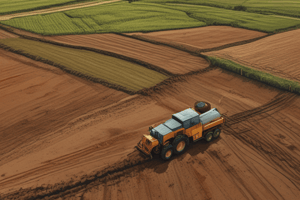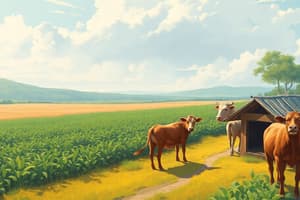Podcast
Questions and Answers
What does agriculture mainly involve?
What does agriculture mainly involve?
- Harvesting mature crops
- Raising animals for food products
- Growing crops and nurturing plants (correct)
- Extracting oils from seeds
Which farming method avoids synthetic fertilizers and GMOs?
Which farming method avoids synthetic fertilizers and GMOs?
- Industrial farming
- Traditional farming
- Conventional agriculture
- Organic farming (correct)
How has climate change impacted crop production?
How has climate change impacted crop production?
- Improved soil nutrient availability
- Reduced the need for pest control measures
- Increased crop yields significantly
- Shifted what crops can be grown where (correct)
What is a key focus of livestock farming in recent years?
What is a key focus of livestock farming in recent years?
Which practice has led to rapid development in the agriculture sector over the past century?
Which practice has led to rapid development in the agriculture sector over the past century?
What is a common challenge faced by crop production due to climate change?
What is a common challenge faced by crop production due to climate change?
What technology has led to the development of automated tractors and irrigation systems in agriculture?
What technology has led to the development of automated tractors and irrigation systems in agriculture?
How does adding organic matter to soil benefit crop production?
How does adding organic matter to soil benefit crop production?
Which practice is aimed at maintaining or enhancing the long-term ecological health of the land in agriculture?
Which practice is aimed at maintaining or enhancing the long-term ecological health of the land in agriculture?
What is a key principle of sustainable farming related to animal welfare?
What is a key principle of sustainable farming related to animal welfare?
Which agricultural practice involves growing different crops in a specific order to maintain soil fertility?
Which agricultural practice involves growing different crops in a specific order to maintain soil fertility?
Which innovation in agricultural technology is aimed at optimizing crop production by identifying areas needing extra care or fertilizer inputs?
Which innovation in agricultural technology is aimed at optimizing crop production by identifying areas needing extra care or fertilizer inputs?
Flashcards are hidden until you start studying
Study Notes
Agriculture
Agriculture is the process of growing crops and raising animals. It includes the practices used to produce food products such as grains, vegetables, fruits, oils, milk, meat, poultry, fish, and forestry products. This sector has experienced rapid development over the past century due to technological innovations, improved understanding of ecological processes, and a larger global population demanding increased levels of food production.
Crop Production
Crop production involves planting seeds, nurturing plants through growth stages, and harvesting mature crops. Crops can be grown on large industrial farms or small family plots, depending on the available resources and preferred approach to agriculture. Some common methods include organic farming, which avoids synthetic fertilizers and genetically modified organisms (GMOs), and conventional agriculture, which often uses GMOs and heavy chemical inputs. Climate change has also had an impact on crop production, causing shifts in what can be grown where, as well as increased challenges with pests and diseases.
Livestock Farming
Livestock farming is a key component of agriculture, focusing on raising animals for food products. Common livestock species include cattle, pigs, chickens, turkeys, ducks, geese, and fish. Livestock farming has also seen significant changes in recent decades, with increased emphasis on efficiency, environmental sustainability, and animal welfare. This has led to the development of a variety of practices, including free-range, grass-fed, and organic livestock production.
Agricultural Technology
Agricultural technology has played a crucial role in enhancing crop and livestock production, improving efficiency, and promoting sustainability in agriculture. Some of the most significant innovations include:
- Automated Farming Equipment: Advances in technology have led to the development of automated tractors, harvesters, and irrigation systems, which can improve efficiency and reduce labor demands.
- Precision Agriculture: This approach uses satellite imagery and other data to optimize crop production by identifying areas in need of extra care or fertilizer inputs.
- Genetically Modified Organisms (GMOs): GMOs have been developed to produce crops that are more resistant to pests, diseases, and environmental stress, thereby improving their yield and reducing the need for chemical inputs.
Soil Management
Soil management is a critical aspect of agriculture, as it directly impacts crop production and the health of the ecosystem. Key practices in soil management include:
- Crop Rotation: This involves growing different crops in a specific order to maintain soil fertility and reduce pest pressure.
- Cover Crops: These are plants grown to protect and enrich the soil, often between growing seasons or before planting a new crop.
- Organic Matter: Adding organic matter to soil helps to improve its structure and nutrient content, which can enhance crop production.
Sustainable Farming
Sustainable farming practices aim to maintain or enhance the long-term ecological health of the land. Some key principles of sustainable farming include:
- Ecological Disruption: Avoiding practices that cause significant harm to the environment, such as the use of certain synthetic fertilizers and pesticides.
- Crop Diversity: Growing a variety of crops can help to maintain soil health, reduce pest pressure, and provide a more stable income for farmers.
- Animal Welfare: Ensuring that animals are raised in a manner that respects their natural behaviors and provides them with adequate space, shelter, and nutrition.
Agriculture continues to evolve, driven by technological advances, changing consumer preferences, and the need to feed a growing global population in a sustainable manner. As such, it remains a vital and dynamic sector that shapes our lives in countless ways.
Studying That Suits You
Use AI to generate personalized quizzes and flashcards to suit your learning preferences.




